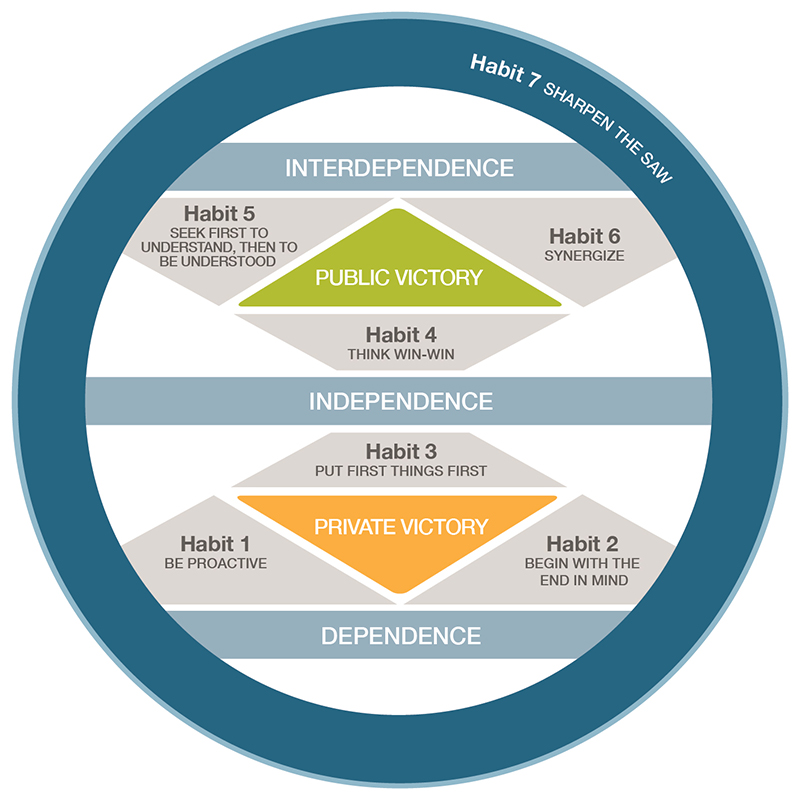
Principles
It is impossible for us to break the law. We can only break ourselves
against the law.
—CECIL B. DEMILLE
against the law.
—CECIL B. DEMILLE
Principles are universal—that is, they transcend culture and geography. They’re also timeless, they never change—principles such as fairness, kindness, respect, honesty, integrity,
service, contribution.
service, contribution.
Principles are also inarguable. That is, they are self-evident. For example,
you can never have enduring trust without trustworthiness. Think about it; that is a natural law.
you can never have enduring trust without trustworthiness. Think about it; that is a natural law.
Natural laws (like gravity) and principles (like respect, honesty, kindness,
integrity, and fairness) control the consequences of our choices. Just as you get bad air and bad water when you consistently violate the environment, so also is trust (the glue of relationships) destroyed when you’re consistently unkind and dishonest to people.
integrity, and fairness) control the consequences of our choices. Just as you get bad air and bad water when you consistently violate the environment, so also is trust (the glue of relationships) destroyed when you’re consistently unkind and dishonest to people.
Effectiveness lies in the balance: the P/PC Balance®. “P” stands for
production of desired results—the golden eggs. “PC” stands for production
capability—the ability or asset that produces the golden egg.
production of desired results—the golden eggs. “PC” stands for production
capability—the ability or asset that produces the golden egg.
1. The principle of continuous learning, of self-reeducation—the discipline
that drives us toward the values we believe in. Such constant learning is required in today’s world. Continuous learning is part of what keeps us feeling empowered in our relationships and accomplished in our work. Technology is constantly changing, and many of us will work in more than five different fields before we retire. Are you willing to be left behind?
that drives us toward the values we believe in. Such constant learning is required in today’s world. Continuous learning is part of what keeps us feeling empowered in our relationships and accomplished in our work. Technology is constantly changing, and many of us will work in more than five different fields before we retire. Are you willing to be left behind?
That is what learning is. You suddenly understand something you’ve understood all your life, but in a new way.
—DORIS LESSING
—DORIS LESSING
2. The principle of service, of giving oneself to others, of helping to facilitate
other people in their endeavors.
other people in their endeavors.
To serve is beautiful, but only if it is done with joy and a whole heart and a free mind.
—PEARL S. BUCK
3. The principle of staying positive and optimistic, radiating positive energy,
and avoiding the four emotional cancers (criticizing, complaining, comparing, and competing).
and avoiding the four emotional cancers (criticizing, complaining, comparing, and competing).
The point of living, and of being an optimist, is to be foolish enough to
believe the best is yet to come.
believe the best is yet to come.
—PETER USTINOV
4. The principle of affirmation of others—treating people as proactive
individuals who have great potential.
individuals who have great potential.
Treat people as if they were what they should be, and you help them
become what they are capable of becoming.
become what they are capable of becoming.
—JOHANN WOLFGANG VON GOETHE
5. The principle of balance—the ability to identify our various roles and to
spend appropriate amounts of time in, and focus on, all of the important roles and dimensions of our lives. Success in one area of our life cannot compensate for neglect or failure in other areas of our life.
spend appropriate amounts of time in, and focus on, all of the important roles and dimensions of our lives. Success in one area of our life cannot compensate for neglect or failure in other areas of our life.
Everyone is a house with four rooms: physical, mental, emotional,
spiritual. Unless we go into every room every day, even if only to keep it
aired, we are not a complete person.
spiritual. Unless we go into every room every day, even if only to keep it
aired, we are not a complete person.
—RUMER GODDEN
6. The principle of spontaneity and serendipity—the ability to experience life with a sense of adventure, excitement, and fresh rediscovery instead of trying to find a serious side to things that have no serious side.
The essence of pleasure is spontaneity.
—GERMAINE GREER
7. The principle of consistent self-renewal and self-improvement in the four
dimensions of one’s life: physical, spiritual, mental, and social/emotional.
dimensions of one’s life: physical, spiritual, mental, and social/emotional.
This is the single most powerful investment we can ever make in life—
investment in ourselves, in the only instrument we have with which to
deal with life and to contribute
investment in ourselves, in the only instrument we have with which to
deal with life and to contribute
—STEPHEN R. COVEY
List five principles that affect your life on a daily basis. In what ways are you
affected? Do they impact you in positive or negative ways?
affected? Do they impact you in positive or negative ways?